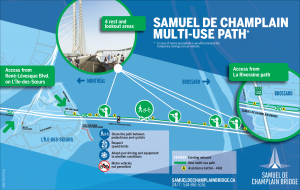Presentation
Scroll downMontreal’s Samuel De Champlain Bridge is one of North America’s busiest spans, with 50 million cars, buses and trucks crossing it each year.
The old Champlain Bridge was open to traffic on June 28,1962, increased traffic combined with the damage caused by road salt and other factors have contributed to the structure’s considerable wear and tear. This is why, in 2015, a new worksite was put into operation to build a new bridge called Samuel De Champlain Bridge. In April 2015, the Government of Canada selected the Signature on the Saint Lawrence consortium for the design, construction, financing and maintenance of the project. The new bridge was built and opened to traffic on July 1, 2019.
In addition to its being used by residents of the metropolitan region for their everyday commute, the crossing is part of a vital overland link for freight transportation between Canada and the United States.
The bridge is 3.4 kilometers long and has three lanes in each direction, with two shoulders that are important assets to ensure good traffic flow. A reserved lane for the Réseau express métropolitain (REM) makes traffic flow even more smoothly.
In order to promote active transportation, the Samuel De Champlain Bridge provides a multi-use pathway to pedestrians and cyclists with a secure and shared year-round link between Montreal and the South Shore. It offers a direct connection between Nun’s Island (Île-des-Sœurs)—from the Claude-Robutel roundabout at the intersection of René-Lévesque Boulevard and Jacques Le Ber Street—and the La Riveraine bike path in Brossard. Its four lookouts also present an impressive view of the St. Lawrence River, the Seaway, and downtown Montreal.
In addition, the bridge incorporates:
- Rigorous environmental monitoring and mitigation measures to protect the surrounding natural environment;
- Architectural quality and features that will enhance Montreal’s cityscape and contribute to the corridor’s status as the main gateway to the city;
Last news
-
- general-info
February 1, 2021Special illumination of the Samuel De Champlain Bridge to mark Black History Month
-
- general-info
June 5, 2020Samuel De Champlain Bridge lit up in green to mark World Environment Day
-
- general-info
April 3, 2020Samuel De Champlain Bridge displaying its rainbow lights in solidarity with the #WeWillGetThroughThis movement
-
- general-info
December 20, 2019Opening of the Samuel De Champlain multi-use path on December, 23rd 2019 at 1PM
